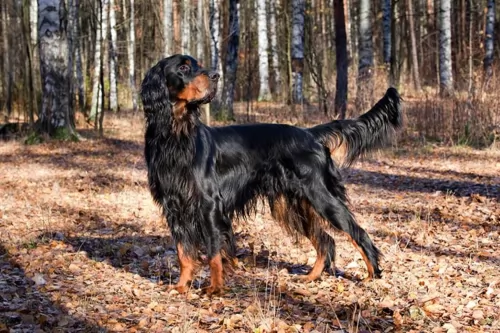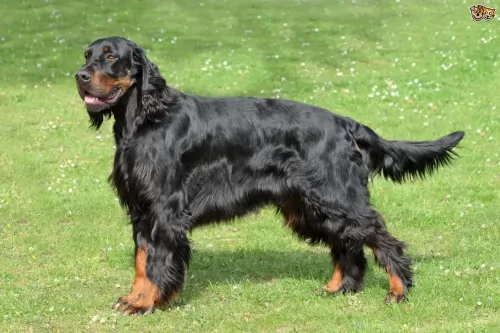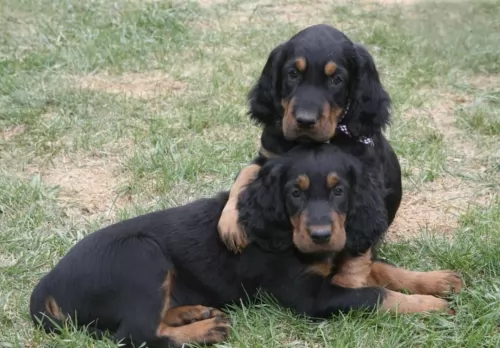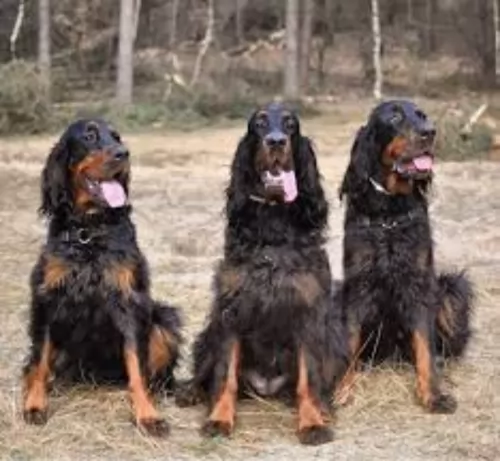 Petzlover
Petzlover Gordon Setter is originated from United Kingdom but Samoyed is originated from Russia. Gordon Setter may grow 10 cm / 4 inches higher than Samoyed. Gordon Setter may weigh 6 kg / 14 pounds more than Samoyed. Both Gordon Setter and Samoyed has almost same life span. Both Gordon Setter and Samoyed has same litter size. Both Gordon Setter and Samoyed requires Moderate Maintenance.
Gordon Setter is originated from United Kingdom but Samoyed is originated from Russia. Gordon Setter may grow 10 cm / 4 inches higher than Samoyed. Gordon Setter may weigh 6 kg / 14 pounds more than Samoyed. Both Gordon Setter and Samoyed has almost same life span. Both Gordon Setter and Samoyed has same litter size. Both Gordon Setter and Samoyed requires Moderate Maintenance.
 The Gordon Setter includes mixes of the English Setter and the Irish Setter. The original purpose of the breed was to hunt game birds.
The Gordon Setter includes mixes of the English Setter and the Irish Setter. The original purpose of the breed was to hunt game birds.
The dog breed hails from Scotland with a history that dates back to the 17th century. The dog was developed in Gordon Castle by the Duke of Gordon IV.
The dog became popular among hunters in the early 19th century. He is the biggest of the setter breeds. It was in 1884 that the American Kennel Club recognized the Gordon Setter.
 The Samoyed is a large breed of dog; a spitz-type dog, with a thick, double-layer coat. The dog was used to help with herding and to also haul sledges for the Siberian Samoyede people.
The Samoyed is a large breed of dog; a spitz-type dog, with a thick, double-layer coat. The dog was used to help with herding and to also haul sledges for the Siberian Samoyede people.
The Samoyed has been used in polar expeditions, including Sir Ernest Shackleton's journey to the Antarctic. They’ve put up with a lot of hardships on these journeys and some of them have lost their lives on these expeditions.
The first standard for the breed was adopted in England in 1909, and in 1923 the original Samoyed Club of America was established.
 The Gordon Setter is a large dog, capable of reaching up to 69cm in height and weighing up to 36kg in weight.
The Gordon Setter is a large dog, capable of reaching up to 69cm in height and weighing up to 36kg in weight.
He belongs to the Setter family and is somewhat heavier than the other Setter breeds. Setter dogs are classified as sporting- or gun dogs. He is a beautiful dog with a pitch black coat with tan markings found around the chest, muzzle and paws as well as those two familiar tan dots above each eye.
Sometimes you can find a small amount of white on the chest. The coat is straight and silky but it can be slightly waved with feathering around the legs, chest, ears and tail. Both the tail and the ears of the dog are also long and feathery. The Gordon has an intelligent, dignified look about him.
The Gordon Setter is a confident, fearless, loyal and affectionate dog. They do well with their human families, when there are other pets in the house as well as children.
He can be a boisterous dog so training and socialization will become necessary. Your Gordon Setter is an intelligent dog and also a dog ready and willing to learn. He is calm and even-tempered but playful too.
He isn’t a dog suited to life in the city if there isn’t an adequately sized garden. He is essentially a country life dog well suited to farms or large fenced gardens.
 The Samoyed is a large herding dog standing at between 48 to 60cm in height and weighing 16 – 30kg. He has a thick, double layer coat that is silvery white.
The Samoyed is a large herding dog standing at between 48 to 60cm in height and weighing 16 – 30kg. He has a thick, double layer coat that is silvery white.
The top layer is fairly long and coarse. The dog sheds heavily once or twice a year, but the dog is described as being hypoallergenic.
The ears of the dog are typical spitz-like – erect. The eyes of the dog are almond in shape and while they are usually brown, they can sometimes be blue too. The tail is long and curls over the dog’s back. When these dogs sleep in the snow, you might notice the tail is folded so that it covers the dog’s nose.
The Samoyed is a friendly dog, to such an extent that you wouldn’t call him a good watchdog. They’re friendly dogs with happy expressions on their faces. They make great family pets and will get on well with children as well as other dogs in the home.
Like all dogs, the Samoyed will need early training and socialization to make him obedient and well rounded. He is intelligent and can easily learn a few basic commands.
 Beautiful to look at, the intelligent and even-tempered Gordon Setter has everything to be confident about. He loves the attention he gets from his human family and is always looking for a pat.
Beautiful to look at, the intelligent and even-tempered Gordon Setter has everything to be confident about. He loves the attention he gets from his human family and is always looking for a pat.
He can be stubborn and he certainly won't like the idea of being left cut off from his family for long periods of time as he is a social dog with those he knows and loves.
The Gordon Setter is energetic and playful so he will need regular exercise. When you bring a Gordon Setter into your home, you bring in a wonderfully loyal pet and companion.
 The Samoyed is a gentle, easy going dog that gets on well with everyone, loving children and being prepared to be friendly towards other dogs too.
The Samoyed is a gentle, easy going dog that gets on well with everyone, loving children and being prepared to be friendly towards other dogs too.
His friendliness makes it that he doesn’t make a good watchdog. He is intelligent and can be trained to obey basic commands.
He loves plenty of exercise, after all he has always been a working dog. Apart from the coat which will require quite a bit of upkeep, the Samoyed is prepared to come into your home and make you a splendid pet and companion.
 Life expectancy for the Gordon Setter is usually about 10 to 12 years and with good nutrition and care, your Gordon can easily reach 12 years of age.
Life expectancy for the Gordon Setter is usually about 10 to 12 years and with good nutrition and care, your Gordon can easily reach 12 years of age.
Every dog is prone to some common health issues and these include among others hip dysplasia, gastric torsion or bloat, retinal atrophy and ear infections.
Large dogs are more prone to hip dysplasia. The disease is a malfunction of the hip joints causing pain and loss of function in the rear legs.
This eye conditon just gets worse over time and can lead to vision loss.
An under-active thyroid causes a decrease in metabolism. Symptoms of hypothyroidism in dogs include weight gain, obesity, cold intolerance, changes in the skin and coat like hair loss and your dog is lethargic.
This can be very dangerous with your pet as the stomach is swollen and the stomach rotates and twists and can lead to death.
 Dogs can get diabetes just like people can. Diabetes is becoming more common in dogs as people try and feed their dogs ‘treats’ such as chocolates, biscuits and ice-cream.
Dogs can get diabetes just like people can. Diabetes is becoming more common in dogs as people try and feed their dogs ‘treats’ such as chocolates, biscuits and ice-cream.
Fortunately diabetes is manageable. Certainly, if you discover signs of diabetes in your pet, get him to the vet. The typical symptoms of diabetes in dogs are increased urination, increased thirst and weight loss. Cataracts and blindness can also occur.
Glaucoma is when there is increased pressure in the eye. It can be hereditary or secondary where there is decreased fluid in the eye because of other eye diseases. Symptoms include pain and even vision loss. It can be treated surgically or with eye drops.
This is an inherited condition in dogs where the thighbone doesn't fit properly into the hip joint. Some dogs will even have lameness in both rear legs. The vet will want x-rays to diagnose hip dysplasia. Unfortunately arthritis can also develop.
 Gordon Terriers are energetic dogs so he is going to require a good deal of exercise each day. Take him with you on your walks and make sure that you give him lots of ball games and rope games.
Gordon Terriers are energetic dogs so he is going to require a good deal of exercise each day. Take him with you on your walks and make sure that you give him lots of ball games and rope games.
All Gordon Setters shed, and their coat will require a good brushing at least twice a week. Check nails, teeth and ears regularly. Brush teeth at least twice a week to prevent dental decay.
As a working dog your Gordon Setter has a special need for a high fat content diet. You can include some raw meat in his high-energy dog kibble. He can also have some cooked brown rice, chicken and vegetables added into his kibble from time to time. Make sure he has access to fresh, cool water.
 The coat of the dog is super thick and in the Spring, the dog sheds a lot. Samoyed dog owners will need to be regular with their brushing routine with these dogs as the coat can easily tangle. Some people just prefer to get their Samoyed to a professional groomer.
The coat of the dog is super thick and in the Spring, the dog sheds a lot. Samoyed dog owners will need to be regular with their brushing routine with these dogs as the coat can easily tangle. Some people just prefer to get their Samoyed to a professional groomer.
This is a working dog, used to working hard in all kinds of conditions. He doesn’t take kindly to being bored with nothing to do and he howls and barks till you take him on a walk. He requires regular exercise such as hiking, ball games, running and swimming. It is why this dog isn’t suited to life on a small property in the city. He requires a large garden or farm and lots of exercise.
If you want your Samoyed to be healthy so that you’re not constantly at the vet, provide him with top quality food. It is always useful and convenient having commercially manufactured food but you want to vary the diet just a bit by providing some homemade food too.
If you boil chicken, brown rice or pasta and spinach, sweet potatoes and carrots in a pot you can chop it all up and freeze it and feed portions twice a week to your dog. Warmed up it can be added to his dry kibble and be a wonderful tasty treat for him. Every now and then you can also include some raw meat which can be beneficial for his skin. Ensure there is always a bowl of fresh, cool water within his reach.